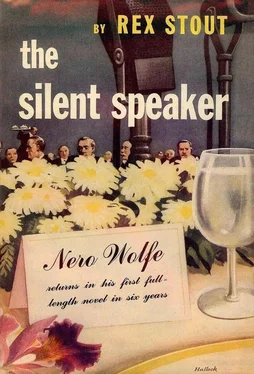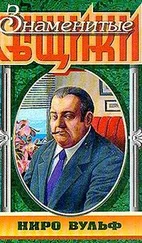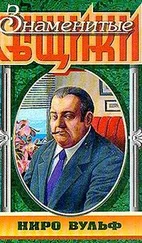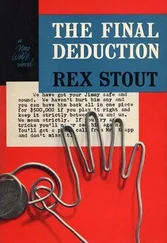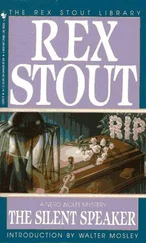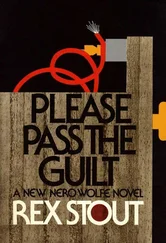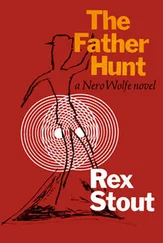A corner table in the side room at Ribeiro’s is a good place to talk. The food is no great treat to one who gets fed by Fritz Brenner three times a day, but it goes down all right, there is no music, and you can wave a fork in any direction without stabbing anybody except your own companion.
“I don’t believe,” Nina said after we had ordered, “that anyone has recognized me. Anyhow no one is staring at me. I guess all obscure people think it would be wonderful to be a celebrity and have people look at you and point you out in restaurants and places. I know I did. Now I simply can’t stand it. It makes me want to scream at them. Of course I might not feel that way if my picture had been in the papers because I was a movie star or because I had done something worth while — you know, remarkable.”
So, I thought, she wanted someone besides Aunt Luella to talk to. Okay, let her talk.
“And yet,” I told her, “you must have had your share of staring before this happened. You’re not actually unsightly.”
“No?” She didn’t try to smile. “How do you know? The way I look now.”
I inspected her. “It’s a bad time to judge,” I admitted. “Your eyes are puffy and you’ve been clamping your jaw so much that your chin juts. But still there’s enough to go by for an estimate. The cheekbone curve is very nice, and the temples and forehead are way above the average. The hair, of course, has not been affected at all. Seeing you from behind on the sidewalk, one man out of three would walk faster to get a look at you from the side or the front.”
“Oh? And the other two?”
“My lord,” I protested, “what do you want for nothing? One out of three is tremendous. I was piling it on, merely because your hair happens to appeal to me and I might go so far as to break into a trot.”
“Then next time I’ll sit with my back to you.” She moved her hand to her lap to make room for the waiter. “I’ve been wanting to ask you, and you’ve got to tell me, who was it that told you to ask me where Ed Erskine was?”
“Not yet. My rule with a girl is to spend the first fifteen minutes discussing her looks. There’s always a chance I’ll say something that appeals to her, and then it’s smooth sailing. Besides, it wouldn’t be in good taste to start working on you while we’re eating. I’m supposed to drag everything out of you, so that’s what I’ll have to do, but I shouldn’t start on it until the coffee, and by that time, if I’m any good, I’ll have you in a frame of mind to let me even copy down your Social Security number.”
“I would hate to miss that.” She did try to smile. “It would be interesting to see you do it. But I promised my aunt I’d be back at the hotel by two-thirty — and by the way, I promised to bring you with me. Will you come?”
My brows went up. “To see Mrs. Boone?”
“Yes.”
“She wants to see me?”
“Yes. Maybe only for fifteen minutes to discuss her looks. She didn’t say.”
“With girls over fifty, five is enough.”
“She’s not over fifty. She’s forty-three.”
“Five is still enough. But if we only have till two-thirty I’m afraid we’d better stall without taking time to break down your resistance. How do you feel? Have you noticed any inclination to melt or relax or put your head on my shoulder?”
“Not the slightest.” Her tone carried conviction. “The only impulse I’ve had was to pull your hair.”
“Then it’ll be a wonder,” I said regretfully, “if you loosen up enough to tell me what size shoes you wear. However we’ll see, as soon as he gets through serving. You haven’t finished your cocktail.”
She did so. The waiter gave us each a steaming plate of shrimps, cooked with cheese and covered with a spicy sauce, and individual bowls of salad on which he had just sprinkled a thin dressing. Nina speared a shrimp with her fork, decided it was too hot to go in whole, halved it, and conveyed a portion to her mouth. She was in no mood for tasting food, but she tasted that, and immediately got some more on her fork.
“I like this,” she said. “Go on and drag things out of me.”
I finished chewing my second shrimp and swallowed it. “My technique is a little unusual,” I told her. “For instance, not only are all ten of you people being followed around, to see what you’re up to now, but also your pasts are being drained through cheesecloth. How do you like this cheese?”
“I like it. I love it.”
“Good. We’ll come here often. There are probably a hundred men — no, more than that, I forgot how important this case is — investigating your people’s pasts, to find out, for example, if Mrs. Boone was having secret trysts with Frank Thomas Erskine on the boardwalk at Atlantic City, or if you and Breslow are champing at the bit until he can get his wife to give him a divorce. That takes time and money, and my technique is different. I prefer to ask you and settle it. Are you?”
“Am I what? Champing?”
“At the bit.”
“No. I’m champing shrimps.”
I swallowed another one. “You see,” I explained, “they’re all up a stump, including Nero Wolfe. They’re not trying to make it more complicated just for the hell of it. The most satisfactory way out of it, the way that would please nearly everybody most, including the investigators themselves, would be the simplest way, namely that one of those six NIA people killed Cheney Boone for the obvious motive, and then killed Phoebe Gunther for some related reason. But the trouble is that if that’s how it was, how are you ever going to find out which one of the six did it, let alone prove it? Apparently not a chance in a billion. The New York police and the FBI have been working on it over a week now, giving it all they’ve got, and where are they? Tailing you !”
“Well.” She herded cheese and sauce with her fork. “You’re buying me a lunch.”
“Certainly, and I’m telling you why, aside from your hair and other personal details. We’re all sunk unless we can find a new angle. I came to you because there’s a possibility that you know something about such an angle without realizing it. Naturally I’m assuming that you want the murderer found and punished. Otherwise—”
“I do. Of course I do.”
“Then suppose we try the direct approach and see how it sounds. Did you know any of these NIA birds personally?”
“No.”
“None of those six?”
“No.”
“How about any NIA people at all? There were around fifteen hundred of them at that dinner.”
“This seems perfectly silly.”
“Then let’s get it over with. Did you?”
“Maybe a few — or rather, their sons and daughters. I graduated from Smith a year ago, and you meet a lot of people. But if we went back over every minute of it, every word of every conversation, we wouldn’t find anything remotely resembling an angle.”
“You don’t think it would do me any good to probe?”
“No.” She glanced at her wrist watch. “Anyway, we haven’t time.”
“Okay. We can go back to it. How about your aunt? Those trysts with Erskine. Did she have trysts?”
Nina made a noise which, under the circumstances, was a fair substitute for a laugh. “Ask her. Maybe that’s what she wants to see you about. If all the pasts are being investigated as you say they are, I should think it would be established by now that Aunt Luella was utterly and exclusively devoted to my uncle, and to everything he did and everything he stood for.”
I shook my head. “You don’t get it. That’s just the point. To illustrate: what if Boone learned something in Washington that Tuesday afternoon about something Winterhoff had done, or something that made him decide to take a certain step affecting Winterhoff’s line of business, and what if he told his wife about it when he saw her in their hotel room (which you might also have heard since you were there too), and what if Mrs. Boone happened to know Winterhoff, not for trysting purposes but just knew him, and what if later, in the reception room, she was talking with Winterhoff during her third cocktail, and what if unintentionally she gave him an idea of what was up? That’s what I mean by a new angle. I could invent a thousand of them just as I invented that one, but what is needed is one that really happened. So I’m asking about your aunt’s circle of acquaintance. Is that malevolent?”
Читать дальше
